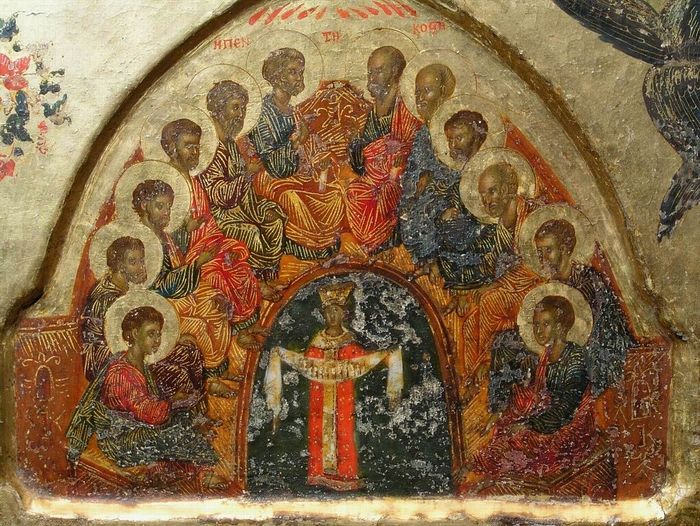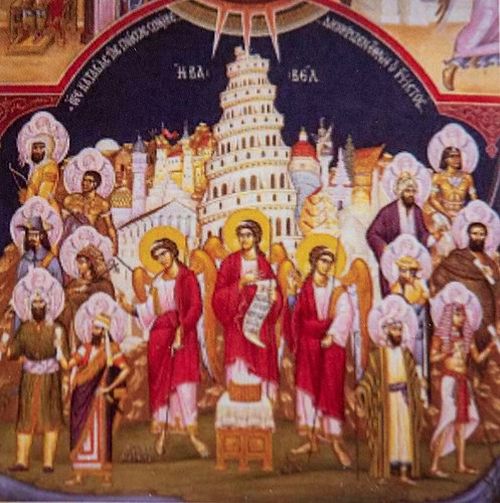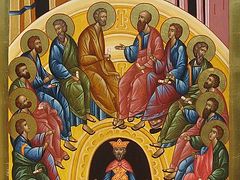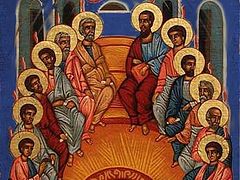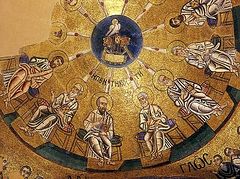When the day of Pentecost had come, they were all together in one place. And suddenly a sound came from heaven like the rush of a mighty wind, and it filled all the house where they were sitting. And there appeared to them tongues as of fire, distributed and resting on each one of them. And they were all filled with the Holy Spirit and began to speak in other tongues, as the Spirit gave them utterance. (Acts 2:1-4)
The description of the day of Pentecost reminds me of Ezekiel 43:1-5. It is not that Acts quotes Ezekiel, but more there is an echo, a parallel between the passages. Adolfo Roitman notes:
“… fulfilling Ezekiel’s prophecy concerning the return of the Divine Presence to the Temple, originally enunciated during the Babylonian Exile: ‘And there, coming from the east with a roar like the roar of mighty waters, was the Presence of the God of Israel, and the earth was lit up by His presence . . . The Presence of the Lord entered the Temple by the gate that faced eastward. A spirit carried me into the inner court, and lo the Presence of the Lord filled the Temple’(Ezek 43:1-5).” (ENVISIONING THE TEMPLE, p 87)
What Ezekiel hears is something “like the roar of mighty waters” (see also Psalm 93). The rushing of water was perhaps one of the noisiest and mighty sounds known in the ancient world before machinery became common place. Ezekiel wants us to understand that the sound he heard was a mighty roaring which would have drowned out all other sound. For the Apostle Luke, writing in Acts, he describes the sound to be a mighty, rushing wind, the howling tempest. He too uses the word “like” – he is searching for a proper comparison, but we get the idea of this mighty sound which accompanies the Presence of God entering His temple, and also entering His disciples. In the Acts account, it is now the disciples who represent the temple of God, as really does the entire world, for Pentecost is the outpouring of God’s Spirit on the world. Ezekiel also describes the earth being “lit up by His presence“- so too in Acts there is the distribution of the tongues of fire. Ezekiel and Luke are both looking for the proper metaphors to help us understand what God’s returning to His temple, coming upon His disciples, filling the world with His Spirit is like. They both are making comparisons but not necessarily telling us literally what happened. Words will not suffice for what was experienced (like trying to explain snow to people living at the equator who don’t even know refrigeration or have never experienced anything freezing – what is snow like?).
And if we think comparing Ezekiel 43 and the Temple with Acts 2 and the Apostles is far fetched, we only need to remember that the Orthodox Church for centuries has read Ezekiel 43:27-44:4 and its description of the Temple as a reference to Mary, the Theotokos, and we read it at three of the Feasts of the Theotokos – her Nativity, Entrance into the Temple, and Dormition. The Theotokos becomes the Temple of the Lord. Add to that St. Paul’s own words: “Do you not know that you are God’s temple and that God’s Spirit dwells in you? . . . For God’s temple is holy, and that temple you are” (1 Corinthians 3:16-17) and “For we are the temple of the living God; as God said, ‘I will live in them and move among them, and I will be their God, and they shall be my people’” (2 Corinthians 6:16). The New Testament is clear that the Jerusalem Temple is to be replaced: “And I saw no temple in the city, for its temple is the Lord God the Almighty and the Lamb” (Revelation 21:22).
The Pentecost experience is not only described in terms comparing it to what it is like (Acts – Ezekiel, Temple – Apostles), but also it is contrasted with the narrative of the account of Babel in Genesis 11, an event that also involved a cacophony of sound.
“The account of the Tower of Babel in Genesis 11 is frequently used in the Liturgy for Pentecost as a foil. Babel is the ‘anti-Pentecost’ whose effects can only be undone by Holy Spirit-empowered Pentecost. The first is a curse, the second a healing. … The survivors of the flood … said ‘Let us build for ourselves a city and a tower with its top in the heavens…’ (11:4). The Lord saw their pride and unwillingness to do as He had told them and said,
Look, they are one people. And they have all one language; and this is only the beginning of what they will do . . . let us go down and confuse their language, so that they will not understand one another’s speech (11:6-7).
And so the Lord scattered them.
This confusion of language has often been seen as a curse: God punishing the people for their act of defiance, for setting themselves up like gods and trying to reach the heavens. This may have been the people’s grand wish, but it is tiny in comparison with an all-powerful God, who had to ‘come down’ from heaven to get a closer look at the tower being built by the people (11:5). The people may have thought they were becoming immortal, but God knew they were not even close.
The Pentecost liturgy takes a slightly different tack. With its ‘When the Most High came down he confused the tongues, divided the nations; but when he parted the tongues of fire, he called all to unity…’, it instead hints at the confusion of language being an act of caring discipline by God. It was a scattering so that He could unite them in His own time and plan. The people of Babel were trying to create their own unity, but had left God out of that unity.” (Kathryn Wehr, “Notes and Comments: The Pentecost Liturgy as a Call for Unity and Mission”, SVTQ Vol 59 #2 2015, pp 236-237)
Biblical scholar N T Wright comments further:
“… the story of the tower of Babel (Genesis 11). Human arrogance reaches a height, quite literally, with the building of a tower to make a name and create security. God comes down to look at the puny little tower (the passage is full of ironic humor), and confuses human languages so that the human race won’t be able to carry out its arrogant ambitions.
What is God doing about evil? On the one hand he is confronting it, judging it and doing something to stop it from having its desired effect. On the other hand he is doing something new, beginning a new project through which the underlying problem of the curse and the disunity of the human family will be replaced by blessing. How Abraham’s family will reverse the curse of Babel is not clear . . . When the promise of Genesis 12 comes through into the New Testament we discover its effect, of course, not least on the day of Pentecost. (EVIL AND THE JUSTICE OF GOD, pp 48-49)

